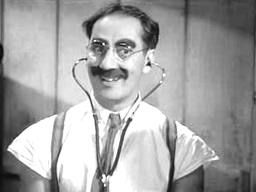

We all know that at times life can be difficult. I fill my days counseling people who struggle with any number of challenging life situations.
Some of these are truly tragic. I think of the mother whose teenage daughter died in a car accident; the number of adults who suffered brutal abuse when they were children; the young college student paralyzed from the waist down when he lost control of his motorcycle and was thrown against a tree. I understand and empathize with the profound pain these people experience.
Other struggles, though, are of a much lesser magnitude. They are hassles or hardships, really, but often reacted to as calamities of the worst sort — a failed math test, criticism from one’s significant other, or a fender bender. We often hold these much too serious, thinking of these bumps in life as tragedies.
Why do we do this? The answer is not complicated. Simply said, we have a built-in tendency to take ourselves too serious. With our human minds, we readily frame our natural desires — to do well, to be liked and loved, to be treated fairly — as life-or-death necessities. Thus, we think: “I must do that well, or else.” “I need to get his approval, or else.” “I have to be treated fairly, or else.” Of course, the “or else” is always a catastrophe of cataclysmic proportions.
Pretty serious stuff. No wonder we far too often travel through our days with anxiety gnawing at our guts and depression weighing down our hearts. No room for happiness there.
Fear not, though, because I have two sure-fire strategies to help you to lighten up and enjoy life more.
1. Work to give up those extreme “need to,’ “must,” and “have to” ways of framing your wants and desires. As I wrote in my May 16, 2013 blog, “Want, Don’t Need,” these ways of thinking make you desperate for what you want and block your hope for peace and happiness.
2. Lighten up, laugh, especially at your own foibles and minor infractions, and fallibility. Don’t take yourself so God-awful serious.
Years ago, as a college basketball player, my old high school invited me to give the pep talk before an important game. Nervous that I might do poorly, I wrote out my speech and rehearsed it many times in front of my bathroom mirror until I got it down to perfection.
To whip the student body into a frenzy, I planned to carry in my pocket a handful of newspaper clippings predicting my team’s demise, pull them out at the proper moment, and rip them to shreds in front of the entire student body. I envisioned that everyone in the auditorium would stand as one and blow the roof right off the building.
I walked onto stage to a thunderous standing ovation. When I reached the climatic moment, I looked around the room and intoned, “The sportswriters say we have no chance, but we are the Bulldogs, and this is what I think of them.” I thrust the clippings over my head, ready for the coup de grace. But, wouldn’t you know it, my hands shook so much that the students in the last row could spot my nervousness.
The auditorium tittered with laughter.
I stood stunned for a moment. But, miracle of miracles, I recognized the humor in the situation. First I smiled and then, as the audience began to clap, I belly-laughed.
I shouted, “Hey guys, this is how the Bears are going to feel when the Bulldogs take the court.”
All two thousand students in the auditorium — students and teachers alike — stood and cheered even louder and longer than I had hoped. With that, I tore the newspaper into strips and threw the shreds up into the air like confetti. The cheering thundered even louder and went on for minutes.
Talk about making lemonade out of lemons. I discovered at the moment one of life’s invaluable lessons: I didn’t have to take myself so doggone serious. Nobody— except maybe me — expected me to be God’s gift to speechmaking. When I lightened up, I opened the door to appreciating the humor of the situation and laughed. Look at the results.
Here’s the lesson. It is next to impossible to feel stressed, angry, anxious, or depressed when you laugh. Laughter not only provides pleasure, but it also serves to:
• reduce stress and other forms of emotional misery such as anxiety and fear.
• bond us with our fellow humorists, which in turn gives us even more pleasure.
• boosts our immune system, lowers our blood pressure, oxygenates our blood, relaxes our muscles, and increases our pain tolerance, all of which gives us much more energy for more future laughter, pleasure, and happiness.
What About You?
Are you like me — and most of the rest of us? Do you hold your desires to do well, be liked, and be treated appropriately as necessary? Do you tend to make mountains out of molehills? Do you take yourself and life’s bumps and potholes as catastrophes? As a fallible member of the human race, I bet you do, more often than is good for you.
If you take a deep breath, step back, and look at the realities of most situations you upset yourself about, most of the times you’ll find they don’t amount to a hill of beans. To see them for what they are takes the tragedy away. To see the humor in the situation — the irony, the absurdity, the silly — provides the belly-laugh.
Live It.
Yes, it's hard to lighten up. But, try these five simple suggestions and see if you don't find yourself laughing more and, as a result, enjoying your life much, much more.
1. Go on a campaign to rid all thoughts of “need,” “must,” “got to,” “have to,” and “should” from your life. These words communicate to you life-and-death direness that doesn’t actually exist and robs you of happiness. Look especially under two categories: (1) doing well (“I must do well in this pep talk.”); (2) being liked (“The students must be impressed with me.”). Write these thoughts out in sentence form and convince yourself of their absurdity.
2. Keep an eye out for life's absurdities. When you run across them, let yourself be amused. Notice how sports fans take their team’s losing as dire as the specter of death. Observe the gentleman who fumes because his steak is not cooked exactly to his liking. Appreciate the silly affectations of the people willing to parade themselves around on those TV reality shows. Life's little circuses offer an endless supply of humor, especially when noticed in yourself.
3. Be willing to laugh at yourself, without being self-derisive. Finding your imperfections humorous can aide you in accepting yourself just as you are — a fallible human being, never perfect, but a full card-carrying member of the human race.
4. Regularly expose yourself to humor. Read a funny book. Listen to a classic recording by George Carlin, Bill Cosby, or Steve Martin. Watch a funny movie or TV show. Listen to Prairie Home Companion on the radio. Go to a comedy club. There are many opportunities to build your funny bone. Take advantage of them.
5. Enjoy a good joke. People like to tell jokes. Welcome them when offered and open yourself up to a good guffaw. The Internet is full of jokes, organized by topic and category, some tasteless and outrageous, others clever and delightful, all potential side-splitters. Find them, enjoy them, and have a good laugh. Better yet, share them with others.
Going Forward
Remember that happiness requires focus and effort. We must work, work, work — on purpose — to sustain our happiness. Lightening up and laughing will go a long way in helping you get there.
To close, I’d like to tell you a joke. Stop me if you’ve heard this one. Do you know why the blonde stared at the orange juice carton? Because it said, “Concentrate.”
Until the next blog, live healthy, happy, and with passion.
Russell Grieger, Ph.D. is the author of several self-help books, all designed to empower people to create a life they love to live. These include: Unrelenting Drive; Marriage On Purpose; and The Happiness Handbook (in preparation). You may contact Dr. Grieger for more information at grieger@cstone.net.



